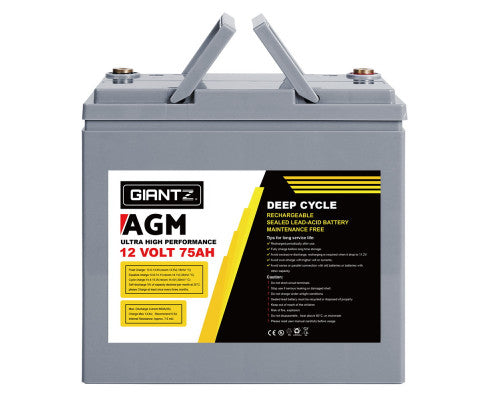sales@tecnotools.com.au
sales@tecnotools.com.au
Call us: 0433 734 100

In an increasingly electrified world, the demand for efficient energy storage solutions has grown exponentially. Deep cycle batteries have emerged as versatile powerhouses capable of meeting the energy storage needs of various applications. Designed to provide reliable, long-lasting power, deep cycle batteries have found their way into a wide range of industries and settings. In this article, we will explore the diverse applications where deep cycle batteries are used and how they are transforming the way we harness and store electrical energy.

Deep cycle batteries play a pivotal role in renewable energy systems, enabling the storage and management of power generated from solar panels, wind turbines, and other renewable sources. These batteries store excess energy produced during peak times and release it during periods of high demand or when the primary energy source is unavailable. They ensure a continuous and reliable power supply, promoting the integration of clean energy into the grid and reducing reliance on fossil fuels.
Deep cycle batteries are commonly employed in recreational vehicles (RVs), boats, and yachts. These batteries provide the necessary power for lighting, appliances, and electronic devices while camping or navigating the open waters. With their ability to withstand repeated charging and discharging cycles, deep cycle batteries ensure a consistent and extended power supply for extended periods, enhancing the comfort and convenience of outdoor adventures.
As the automotive industry shifts towards greener alternatives, deep cycle batteries are a key component of electric vehicle (EV) power systems. These batteries store and deliver the energy needed to propel electric cars, buses, and bikes. Deep cycle batteries with high energy density and long cycle life contribute to the driving range, performance, and overall efficiency of EVs, making them a vital part of the transportation revolution.
In remote areas or regions with unreliable grid infrastructure, deep cycle batteries are utilized in off-grid power systems. These systems provide electricity for homes, farms, telecommunications towers, and other critical facilities that are not connected to the main power grid. Deep cycle batteries, coupled with renewable energy sources or diesel generators, ensure a steady power supply, allowing individuals and communities to thrive in remote locations.
Deep cycle batteries find extensive use in industrial and commercial settings as backup power systems. They provide uninterrupted power during outages, ensuring continuous operation of critical processes, data centers, emergency lighting, and security systems. Deep cycle batteries offer rapid response times, high power outputs, and can be configured in scalable arrays to meet the demands of various industrial applications.
Deep cycle batteries are instrumental in bringing electricity to remote communities that are far from the main power grid. These batteries store energy from renewable sources like solar or wind and provide a stable power supply for lighting, cooking, healthcare facilities, and education centers. By employing deep cycle batteries in microgrids, remote communities can access clean and reliable energy, improving their quality of life and economic opportunities.
A battery box serves several important purposes. Here are some key reasons why a battery box is essential for deep cycle battery applications:

Protection from Physical Damage: Deep cycle batteries are often used in mobile or rugged applications such as boats, RVs, or off-road vehicles. These environments expose the batteries to vibrations, shocks, and impacts that can potentially damage the battery's casing or internal components. A battery box provides a sturdy enclosure, protecting the battery from external forces and ensuring its structural integrity.
Containment of Hazardous Materials: Deep cycle batteries contain corrosive electrolytes and, depending on the chemistry, may release flammable gases during charging or discharging. A battery box helps contain any leaks or spills, preventing the electrolyte from coming into contact with surrounding objects or surfaces. It minimizes the risk of acid damage, corrosion, and accidental exposure to harmful substances.
Thermal Management: Deep cycle batteries can generate heat during charging and discharging processes, particularly under heavy loads or high temperatures. A battery box with proper ventilation helps dissipate heat effectively, reducing the risk of overheating and extending the battery's lifespan. It also helps maintain a stable operating temperature range, which is critical for optimizing battery performance and preventing thermal runaway.
Environmental Protection: Deep cycle batteries used in outdoor or marine environments are exposed to various weather conditions, including rain, humidity, and saltwater. A battery box with a tight seal and appropriate sealing grommets prevents water ingress, protecting the battery from moisture and corrosion. It also shields the battery from dust, dirt, and other contaminants that can degrade its performance and efficiency over time.
Enhanced Safety: Deep cycle batteries have exposed terminals that can pose a safety hazard if accidentally touched or short-circuited. A battery box with proper insulation and terminal covers helps mitigate the risk of accidental contact, reducing the chance of electrical shocks, burns, or short circuits. It provides an added layer of protection, especially in applications where there is a higher likelihood of human interaction or potential mishandling.
Compliance with Regulations: In certain industries and applications, there may be specific regulations and standards that require the use of battery enclosures or containment solutions. A battery box ensures compliance with these requirements, demonstrating a commitment to safety and responsible battery management practices.
By utilizing a battery box, users can safeguard their deep cycle batteries against physical damage, contain hazardous materials, manage heat effectively, protect the environment, enhance safety, and meet regulatory obligations. It provides peace of mind, prolongs the battery's lifespan, and ensures optimal performance, making it an essential accessory for deep cycle battery applications.
Deep cycle batteries have revolutionized the way we store and utilize electrical energy across a diverse range of applications. From renewable energy systems to recreational vehicles, electric vehicles to off-grid power systems, and industrial backup to remote community electrification, deep cycle batteries have proven their mettle as reliable, efficient, and sustainable energy storage solutions. As technology advances and the demand for clean, portable power grows, deep cycle batteries will continue to play a crucial role in shaping a more sustainable and electrified future.